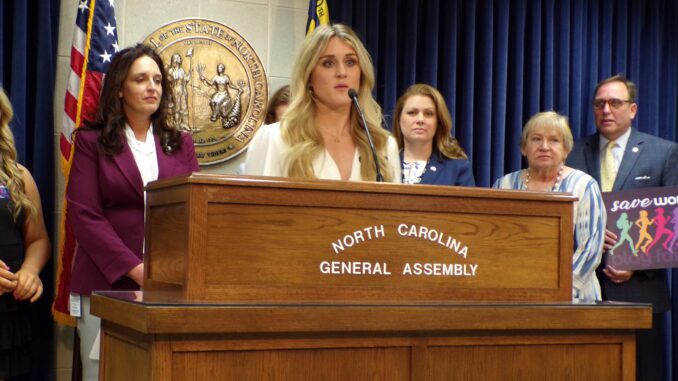
The North Carolina legislature will vote soon to override Gov. Roy Cooper’s veto of House Bill 574, the Fairness in Women’s Sports Act. This new law, which prohibits biological male students from participating in teams designated for females, women, or girls on the middle school, high school, and collegiate levels, serves as a commonsense blueprint for other states looking to protect women’s privacy and their place on the field.
Across the country, there are increasingly more stories of biological female athletes being displaced or defeated by biological males who identify as female or are in the midst of transitioning.
Most notably is the story of Riley Gaines, a former 12-time All-American swimmer at the University of Kentucky. Gaines was subjected to unfair treatment when she was forced to face biological male Lia Thomas in the NCAA Division 1 Women’s Swimming National Championships in the 200-yard freestyle event. Gaines actually tied Thomas for fifth place in the finals, yet was handed the sixth place trophy for the photo op by the NCAA representative.
Thomas swam for the University of Pennsylvania’s Men’s Swim Team from 2017 to 2020, where he (at the time) placed near the bottom of the ranks. Thomas then joined the Women’s Swim Team in 2021 where, as a 6’1” biological male, she eventually won a national championship in the 500 freestyle event.
Gaines has used this experience as a platform to advocate on behalf of herself, and women across the country, who have dedicated their lives to their sport.
Though Gaines has gained momentum in the media for bravely sharing her story, unfortunately, her experience is not unique.
Chelsea Mitchell, a track-and-field athlete from Canton, Connecticut, saw several state and regional title opportunities stripped from her while competing against two transgender female athletes in the 55-meter dash.
Since 2013, the Connecticut Interscholastic Athletic Conference (CIAC) has allowed transgender athletes to compete in women and girls’ sports. In 2017, two transgender female students began competing in the Women’s Track and Field competition, and as a result, those transgender female runners took home 15 women’s state track championship titles. The previous year, those titles were won by nine different females.
Mitchell sued the CIAC alongside three other athletes, asking the court to bar Connecticut from allowing biological males from competing in women’s sports and effectively deleting all athletic records set by transgender athletes. The case is set to be reheard by a New York-based federal appeals court in 2023.
Notably outspoken on this issue is Caitlyn Jenner, someone who knows a thing or two about competing at the highest levels as a male athlete, transitioning, then participating in sports as a transgender female.
Caitlyn Jenner, formerly known as Bruce Jenner, won the Olympic gold medal in 1976, when he (at the time) competed in the decathlon – setting a men’s world record in the process which held for four years. Having transitioned nearly 40 years later, Jenner knows there are fundamental differences between men and women – especially when it comes to their athletic capabilities.
That’s why Jenner recently launched the Fairness First PAC – a political action committee that will “put parental rights at the forefront of education and keep boys out of women’s sports.”
“We cannot let biological boys compete in women’s sports. It would ruin women’s sports,” Jenner explained. As if to emphasize the differences, Jenner added, “A year after hormone replacement therapy, I could still hit the golf ball 300 years.”
Title IX was enacted in 1972, protecting Americans from discrimination in any school or other educational program on the basis of sex. According to the Department of Justice, before Title IX, “women were often excluded from or had only limited access to educational programs.” This includes sports.
Now, centuries of fighting for women’s equality are being erased by the inclusion of biological men in women’s athletic competitions.
It is imperative we protect women and girls from losing out on an opportunity to earn state and national titles, scholarship opportunities, or even simply having a level playing field to pursue her best on the athletic fields.
The North Carolina General Assembly and previously U.S. House of Representatives took a good step in preserving the rights of women and girls across the country by passing common sense legislation to keep women in women’s sports. I am hopeful states around the country will follow suit.
Jill Homan is president of Javelin 19, a real estate investment & development firm, and a mother of a four-year old son and a six-year-old daughter.



